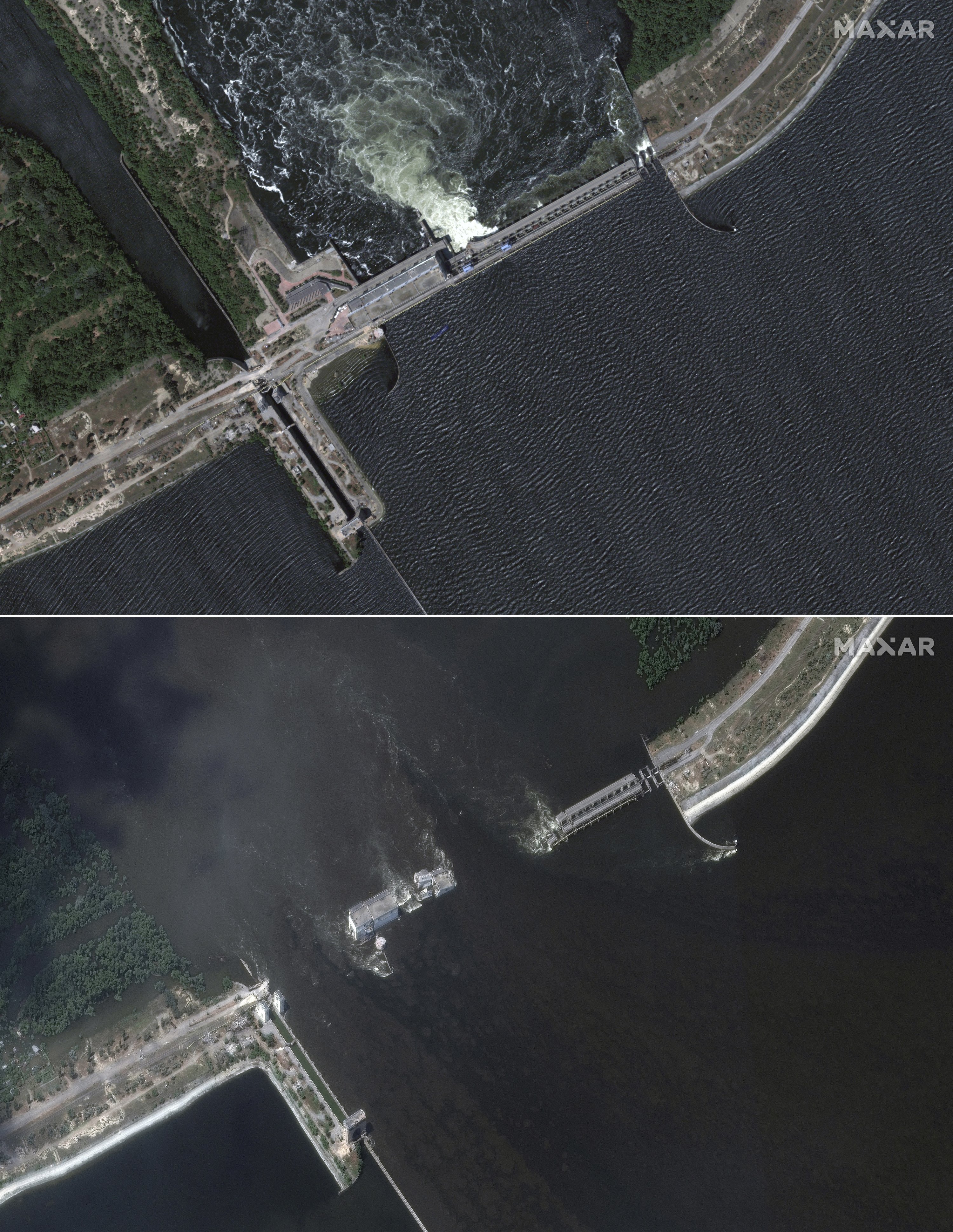© Turkuvaz Haberleşme ve Yayıncılık 2026
Ukrainian President Volodymyr Zelenskyy visited Thursday the country's southeastern region which has been devastated by a flood after alleged Russian attacks breached a key dam in the region earlier in the week.
Meanwhile, at least five people have died from the flooding in a nearby Russian-occupied city, its Kremlin-appointed mayor confirmed the first official report of deaths from one of the largest environmental crises since Russia's invasion of Ukraine.
Vladimir Leontyev, the Russian-appointed mayor of Nova Kakhovka, told Russian state TV that two other people who had gone missing after Tuesday's dam breach had been found, and efforts were underway to evacuate them.
Officials say more than 6,000 people have been evacuated from dozens of inundated cities, towns and villages on both the Russian and Ukrainian-controlled sides of the Dnieper River, which has become part of the front line between the fighting forces.
The collapse of the Kakhovka hydroelectric dam and the emptying of its reservoir on the river have added to the misery that the region has suffered for more than a year from artillery and missile attacks.
Rescue workers fanned out to deliver drinking water to beleaguered locals, warning that contaminated water could cause illness.
Thousands of people have been left homeless, cropland has been ruined, access to electricity and mobile phone networks has been limited or cut off entirely, and land mines have been displaced by the surging waters, officials say.
On the Ukrainian-controlled western bank, President Zelenskyy arrived Thursday to evaluate the response to damage caused by the dam breach, including efforts to evacuate civilians and provide them with drinking water and other support.
After visiting an aid distribution point and a medical facility, Zelenskyy ordered Ukrainian officials to provide a "fair valuation" of flood damages and develop a scheme to compensate residents whose property was damaged or whose businesses had to relocate, his office said in an online update.
In areas that they administer, Russian-appointed authorities said nearly two dozen people have been hospitalized, 4,280 people have been evacuated and some 14,000 buildings have been flooded.
Russian officials say the destruction of the dam, which created a giant reservoir of water used for irrigation and drinking water, will eventually halt fresh water supplies to Russian-controlled Crimea, even though the peninsula has enough fresh water for now – with its reservoirs 80% full.
Ukrainian authorities cut off fresh water supplies to Crimea after Moscow's illegal annexation of the peninsula in 2014, and Russian President Vladimir Putin cited the need to restore them among the main reasons for his decision to invade Ukraine.
Regional Governor Oleksandr Prokudin said the average level of flooding Thursday morning in the region was more than 5.6 meters (18 feet) and roughly 600 square kilometers (231 square miles) of the region were submerged – more than two-thirds of that on the Russian-controlled eastern bank.

He said nearly 2,000 people had been evacuated from Ukraine-controlled areas, and the operations were continuing despite constant shelling from Russian forces across the river.
"People are tired ... (they) have no desire to flee to other regions of Ukraine," Prokudin said.
The true scale of the disaster is yet to emerge in an affected area that was home to more than 60,000 people.
French President Emmanuel Macron tweeted that the destruction of the dam was an "attack" and an "atrocious act," without saying who is to blame. Paris said it was rushing aid including water purifiers, 500,000 water purification tablets and hygiene kits to help people displaced by the disaster.
Ukrainian officials have accused Russia of purposely destroying the dam, which is located in an area controlled by Russian forces.
President Alexander Lukashenko of Belarus, a key ally of Russian President Vladimir Putin, backed the Russian claim that Ukraine blew up the dam to distract attention from what it described as a botched Ukrainian attempt to launch a counteroffensive.
"They needed to cover up the three days of their 'counteroffensive' in which they lost nearly 200 armored vehicles and more than 2,000 troops," he said during Thursday's meeting with officials. "And so it's all about Kakhovka and no one is talking about that. It's quite obvious."
